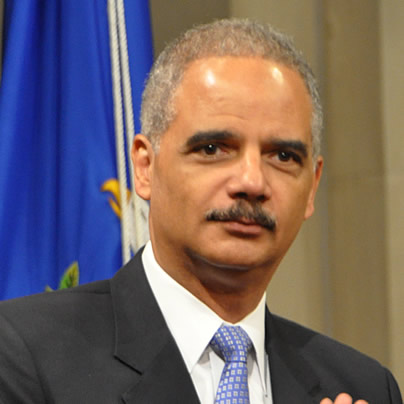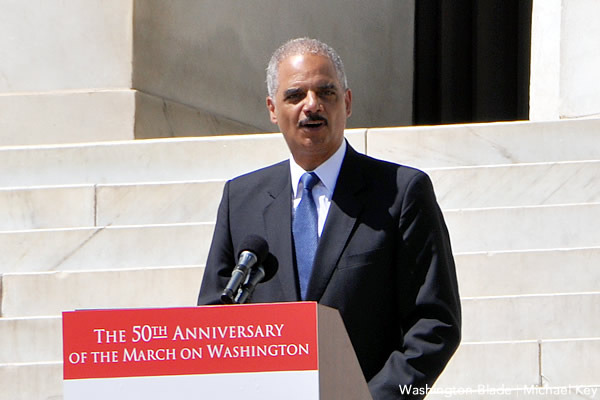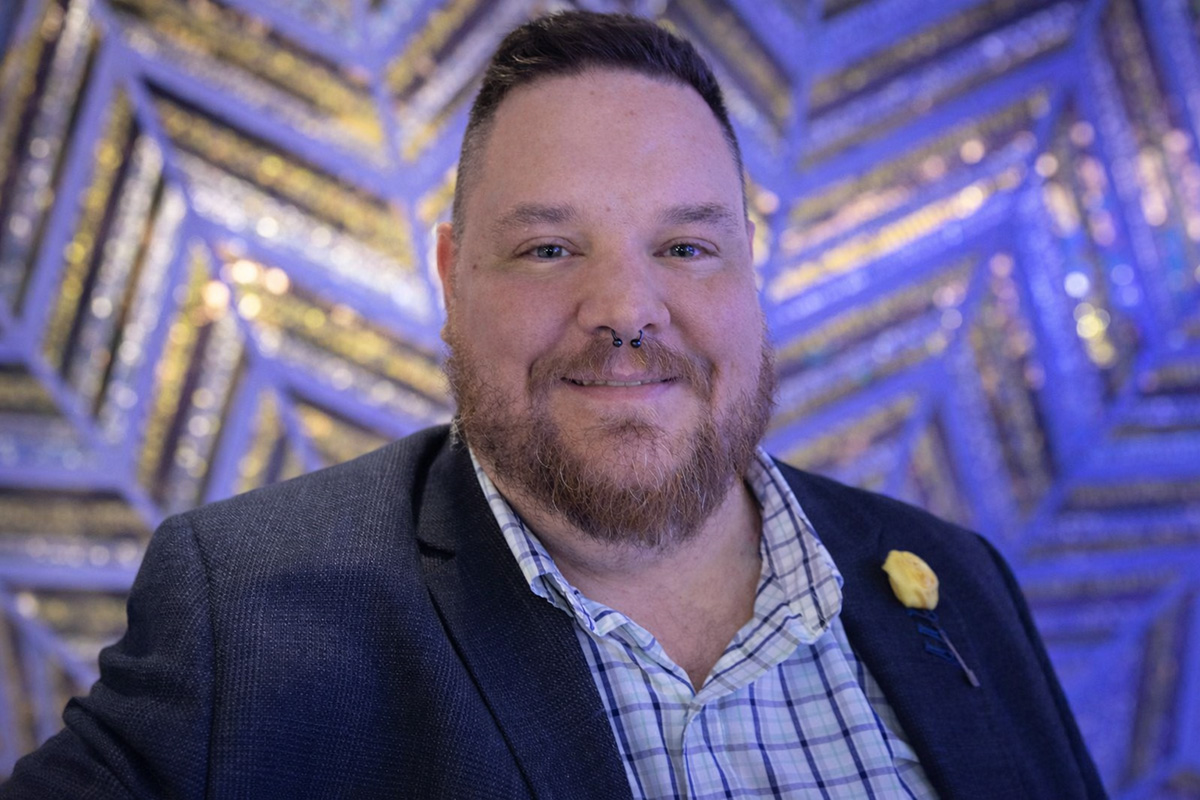News
Months after court ruling, DOMA issues remain unresolved
Social Security, veterans benefits and family leave not flowing in non-marriage equality states


U.S. Attorney General Eric Holder has pledged to extend federal benefits to married gay couples to the furthest extent possible under the law. (Washington Blade file photo by Michael Key)
Ever since the Supreme Court ruled against the Defense of Marriage Act last year, the Obama administration has been rolling out on a continual basis new federal benefits for married same-sex couples — but access to some benefits remains uncertain months after the decision.
While the administration has afforded a preponderance of the 1,138 federal benefits of marriage to same-sex couples, other benefits — including Social Security, veterans and family leave benefits — are still in limbo for those living in non-marriage equality states. For these benefits, federal policy looks to the place of residence, not the place of celebration, in determining whether a person is married.
The policy of the Obama administration has been to expand benefits to married same-sex couples to the furthest extend possible under the law following the court decision against DOMA. That position was formalized last week in a memo from U.S. Attorney General Eric Holder extending certain federal benefits under the purview of the Justice Department to married gay couples.
“It is the Department’s policy, to the extent federal law permits, to recognize lawful same-sex marriages as broadly as possible, and to recognize valid in the jurisdiction where the marriage was celebrated,” Holder writes.
Thus far, the administration has extended numerous benefits to married same-sex couples related to taxes, immigration, federal employee benefits, employer-provided pensions and, most recently, the ability to refuse to testify against a spouse in federal court — even if these couples live in non-marriage equality states. The Justice Department has also ceased enforcement of a provision in Title 38, which governs veterans benefits, that independently defines marriage in opposite-sex terms.
But things get dicier when it comes to other benefits where the law governing them looks to the state law where a couple resides, rather than the state law where the couple was married in determining whether a marriage is legitimate. Does the spirit of the Supreme Court ruling against DOMA mean that these portions of these laws should also not be enforced, or are they so far removed from the ruling they require a legislative fix?
One such issue is with Social Security benefits. Although the Social Security Administration is processing retirement and survivor benefits for same-sex couples living in marriage-equality states, for the time being, it’s placing applications on hold for married same-sex couples living in places that don’t their recognize their union.
Kia Anderson, a Social Security spokesperson, said work coordinated with the Justice Department is still underway to determine whether her agency can recognize these same-sex marriages for benefits purposes.
“We are working with the Department of Justice to develop and implement policy and processing instructions on this issue,” Anderson said. “However, we encourage people to apply right away for benefits, even if they aren’t sure they are eligible. Applying now will protect against the loss of any potential benefits.”
Yet another benefit on hold for married same-sex couples living in non-marriage equality states is veterans benefits, which include disability benefits, survivor benefits and joint burial at a veteran’s cemetery for the spouses of former service members. As with Social Security law, a portion of veterans’ law, 103(c) of Title 38, looks to state of residence, not the state of celebration, to determine whether a couple is married.
Genevieve Billia, a spokesperson for the Department of Veterans Affairs, said her department is still reviewing the issue of these benefits with the Justice Department.
“VA is working closely with the Department of Justice to develop guidance to process cases involving same-sex spousal benefits, and to implement necessary changes swiftly and smoothly in order to deliver the best services to all our nation’s veterans,” Billia said. “Our commitment to provide all veterans and their families with their earned care and benefits will continue to be our focus as VA implements the Supreme Court’s decision in Windsor, and the president’s direction on Title 38.”
The continued enforcement of 103(c) of Title 38 to discriminate against gay couples has been a cause for concern for U.S. senators. Last month, seven senators — led by Sen. Mark Udall (D-Colo.) — called on the Obama administration to stop enforcing the law in a way that blocks gay veterans in same-sex marriages from receiving spousal benefits.
Stephen Peters, president of the American Military Partner Association, called the issue “a top concern” among veterans belonging to the LGBT military group.
“While we understand it takes time to review existing policies and laws in light of the Windsor decision, for the sake of our veterans and their families, our hope is that the administration will take swift action in extending full and equal VA benefits no matter what state the veteran and their family live in,” Peters said. “These veterans have earned these benefits and there is no valid reason why they should continue to be denied them.”
The American Military Partner Association has launched an online petition calling on Holder to stop enforcing U.S. code governing veterans benefits in a way that discriminates against same-sex couples. According to the organization, a little more than 1,000 people had signed the petition as of Wednesday.
Ian Thompson, legislative representative for the American Civil Liberties Union, expressed confidence the administration would be able to come to a conclusion on these issues as it has done with other benefits in the aftermath of the DOMA ruling.
“Federal agencies have moved with commendable speed to extend recognition to married same-sex couples, and to do so in a way that recognizes that these marriages don’t dissolve when a couple crosses state lines,” Thompson said. “While more work remains, including with SSA and the VA, we are confident that these issues can be properly addressed.”
The Justice Department didn’t respond to the Blade’s request for comment on the pace with which these benefits are being rolled out or when these outstanding issues will be resolved.
Shin Inouye, a White House spokesperson, touted the administration’s work so far in implementing benefits as he acknowledged “some work remains.”
“Following the Supreme Court’s ruling in Windsor, the president directed the attorney general to work with the Cabinet to review federal law to ensure the decision and its implications for federal benefits and obligations are implemented swiftly and smoothly,” Inouye said. “That process is ongoing, and while some work remains, the administration has worked to affirm the principle that all couples who are legally married receive full and equal recognition, to the greatest extent possible under the law.”
Should the administration determine it must continue enforcing these laws, a legislative fix from Congress would be necessary to ensure these benefits can flow to gay couples. For the Social Security benefits, that would mean passage of the Social Security Equality Act, sponsored by Rep. Linda Sanchez in the House. For the veterans benefits, that would mean passage of the Charlie Morgan Act, sponsored by Sen. Jeanne Shaheen (D-N.H.) in the Senate.
The federal benefits of marriage across the board would be assured for married gay couples regardless of where they live after passage of the Respect for Marriage Act, which is sponsored by Rep. Jerrold Nadler (D-N.Y.) in the House and Sen. Dianne Feinstein (D-Calif.) in the Senate.
A Senate Judiciary Committee aide told the Blade last year that a Senate hearing was in the works for fall 2013 on the legislation. Although the hearing never took place, a Senate aide told the Blade plans are still underway for a hearing.
“Chairman Leahy continues to push for timely and comprehensive implementation of the Windsor decision, including last week’s landmark announcement that the Justice Department will treat all lawfully married couples equally in federal legal matters,” the Leahy aide said. “Chairman Leahy is committed to taking discrimination out of our laws, and he is working to schedule a hearing and build support for the Respect for Marriage Act.”
Not all the outstanding issues in the aftermath of the DOMA ruling are related to law. Benefits are blocked from flowing to married same-sex couples in non-marriage equality states under the Family & Medical Leave Act not because of statute, but by regulation, which the administration could change at any time without action from Congress.
And that change is already taking place. Last last year, the Department of Labor announced it was changing the regulations for the Family & Medical Leave Act — along with regulations for a slew of other laws — to ensure those benefits flow to married same-sex couples living in non-marriage equality states. According to Thompson’s HR Compliance Expert, the change will be implemented in March.
Laura Fortman, principal deputy administrator of the Labor Department’s Wage & Hour Division, wrote about the proposed change in a little-noticed blog post at the time.
“No one should have to choose between succeeding at work and being a loving family caregiver,” Fortman said. “The FMLA’s protections help ensure that people have the opportunity to be both and our proposed rulemaking is an important step in ensuring the law keeps up with the needs of all families in this country.”
Rea Carey, executive director of the National Gay & Lesbian Task Force, said her organization looks forward to the day when the DOMA decision is “fully implemented” by the federal government.
“Steady progress is being made and more is to come,” Carey said. “For example, we are working with the Department of Health and Human Services to ensure that health insurance plans offer coverage for same-sex spouses regardless of where they live. Big picture, we fully expect this landmark decision to continue to positively impact the lives of LGBT people and their families for years to come and in ways that we haven’t even imagined.”
Uganda
LGBTQ Ugandans targeted ahead of country’s elections
President Yoweri Museveni won 7th term in disputed Jan. 15 vote

Barely a week after Ugandan President Yoweri Museveni secured a 7th term in an election marred by state violence, intimidation, and allegations of fraud, the country’s queer community spoke about how the election environment impacted it.
The LGBTQ lobby groups who spoke with the Washington Blade noted that, besides government institutions’ failure to create a safe and inclusive environment for civic participation by all Ugandans, authorities weaponized the Anti-Homosexuality Act to silence dissent and discourage queer voter engagement.
The rights groups note that candidates aligned with Museveni’s ruling National Resistance Movement — including Parliament Speaker Anita Among — during the campaigns accused their rivals of “promoting homosexuality” to discredit them while wooing conservative voters.
Queer people and LGBTQ rights organizations as a result were largely excluded from the formal political processes for the election as voters, mobilizers, or civic actors due to fear of exposure, stigma, violence, and legal reprisals.
“This homophobic rhetoric fueled public hostility and emboldened vigilante violence, forcing many queer Ugandans into deeper hiding during the election period,” Uganda Minority Shelters Consortium Coordinator John Grace stated.
Some queer people had expressed an interest in running for local council seats, but none of them formally registered as candidates or campaigned openly because of safety concerns and local electoral bodies’ discriminatory vetting of candidates.
“UMSC documented at least three incidents of election-related violence or intimidation targeting LGBTQ+ individuals and activists,” Grace noted. “These included harassment, arbitrary detentions, extortions by state and non-state actors, digital cat-fishing, and threats of outing.”
Amid such a militarized and repressive election environment, Let’s Walk Uganda Executive Director Edward Mutebi noted queer-led and allied organizations engaged in the election process through restricted informal voter education, community discussions, and documenting human rights violations.
“Fear of backlash limited visibility and direct participation throughout the election cycle,” Mutebi said. “But despite the hostile environment of work, Let’s Walk Uganda was able to organize a successful transgender and gender diverse youth training on electoral security and safety.”
Museveni’s government escalated its repressive actions during the Jan. 15 elections by shutting down the internet and suspending nine civil society organizations, including Chapter Four Uganda and the National Coalition of Human Rights Defenders, for allegedly engaging in activities that are prejudicial to the security and laws of the country.
The suspension of the rights organizations remains in force, an action both Mutebi and Grace condemn. They say it prevents queer Ugandans from accessing urgent services from the affected groups.
“For the LGBTQ community, the impact has been immediate and deeply harmful. Many of the suspended organizations, like Chapter Four Uganda, were critical partners in providing legal representation, emergency response, and documentation of rights violations,” Grace said.
This has compelled UMSC and its other partners to handle increased caseloads with limited resources, while navigating heightened scrutiny and operational risk.
“The suspension has disrupted referral pathways, delayed urgent interventions, and weakened collective advocacy for marginalized groups and minority rights defenders, which calls for urgent international solidarity, flexible funding, and protection mechanisms to safeguard the work of grassroots organizations operating under threat,” Grace stated.
Mutebi warned that such repressive actions are tyrannical and are indicative of shrinking civic space, which undermines democratic accountability as the promotion and protection of human rights is ignored.
With Museveni, 81, extending his tenure at State House from a landslide win of 72 percent, UMSC and LWU consider a bleak future in the protection of rights for queer Ugandans and other minority groups.
“Without significant political and legal shifts, LGBTQ persons will face continued criminalization, reduced civic space, and heightened insecurity, making sustained advocacy and international solidarity more critical than ever,” Mutebi said. “ It is unimaginable how it feels to live in a country with no hope.”
Grace, however, affirmed the resistance by local queer lobby groups will continue through underground networks, regional solidarity, and digital organizing.
The duo noted that a win by Museveni’s main challenger and rapper, Bobi Wine, who only managed 24 percent of the total votes cast, could have enabled the opening up of civil space and human rights protections in Uganda.
Wine, for his part, spoke in favor of the respect for the rule of law and human rights during his campaign.
“While Bobi Wine’s past stance on LGBTQ rights was inconsistent, his recent shift toward more inclusive rhetoric and international engagement suggested a potential opening for dialogue,” Grace said. “A win might have created space for policy reform or at least reduced state-sponsored homophobia, though structural change would still require sustained pressure and coalition-building.”
Mutebi stated that a change in Uganda’s leadership to a youthful leader like Wine could have offered an opening, but not a guarantee for progress on inclusion and human rights. Mutebi added existing institutionalized and societal homophobia remain in place.
Federal Government
Trump-appointed EEOC leadership rescinds LGBTQ worker guidance
The EEOC voted to rescind its 2024 guidance, minimizing formally expanded protections for LGBTQ workers.

The U.S. Equal Employment Opportunity Commission voted 2–1 to repeal its 2024 guidance, rolling back formally expanded protections for LGBTQ workers.
The EEOC, which is composed of five commissioners, is tasked with enforcing federal laws that make workplace discrimination illegal. Since President Donald Trump appointed two Republican commissioners last year — Andrea R. Lucas as chair in January and Brittany Panuccio in October — the commission’s majority has increasingly aligned its work with conservative priorities.
The commission updated its guidance in 2024 under then-President Joe Biden to expand protections to LGBTQ workers, particularly transgender workers — the most significant change to the agency’s harassment guidance in 25 years.
The directive, which spanned nearly 200 pages, outlined how employers may not discriminate against workers based on protected characteristics, including race, sex, religion, age, and disability as defined under federal law.
One issue of particular focus for Republicans was the guidance’s new section on gender identity and sexual orientation. Citing the 2020 U.S. Supreme Court’s Bostock v. Clayton County decision and other cases, the guidance included examples of prohibited conduct, such as the repeated and intentional use of a name or pronoun an individual no longer uses, and the denial of access to bathrooms consistent with a person’s gender identity.
Last year a federal judge in Texas had blocked that portion of the guidance, saying that finding was novel and was beyond the scope of the EEOC’s powers in issuing guidance.
The dissenting vote came from the commission’s sole Democratic member, Commissioner Kalpana Kotagal.
“There’s no reason to rescind the harassment guidance in its entirety,” Kotagal said Thursday. “Instead of adopting a thoughtful and surgical approach to excise the sections the majority disagrees with or suggest an alternative, the commission is throwing out the baby with the bathwater. Worse, it is doing so without public input.”
While this now rescinded EEOC guidance is not legally binding, it is widely considered a blueprint for how the commission will enforce anti-discrimination laws and is often cited by judges deciding novel legal issues.
Multiple members of Congress released a joint statement condemning the agency’s decision to minimize worker protections, including U.S. Reps. Teresa Leger Fernández (D-N.M.), Grace Meng (D-N.Y.), Mark Takano (D-Calif.), Adriano Espaillat (D-N.Y.), and Yvette Clarke (D-N.Y.) The rescission follows the EEOC’s failure to respond to or engage with a November letter from Democratic Caucus leaders urging the agency to retain the guidance and protect women and vulnerable workers.
“The Equal Employment Opportunity Commission is supposed to protect vulnerable workers, including women, people of color, and LGBTQI+ workers, from discrimination on the job. Yet, since the start of her tenure, the EEOC chair has consistently undermined protections for women, people of color, and LGBTQI+ workers. Now, she is taking away guidance intended to protect workers from harassment on the job, including instructions on anti-harassment policies, training, and complaint processes — and doing so outside of the established rule-making process. When workers are sexually harassed, called racist slurs, or discriminated against at work, it harms our workforce and ultimately our economy. Workers can’t afford this — especially at a time of high costs, chaotic tariffs, and economic uncertainty. Women and vulnerable workers deserve so much better.”

The Comings & Goings column is about sharing the professional successes of our community. We want to recognize those landing new jobs, new clients for their business, joining boards of organizations and other achievements. Please share your successes with us at [email protected].
The Comings & Goings column also invites LGBTQ+ college students to share their successes with us. If you have been elected to a student government position, gotten an exciting internship, or are graduating and beginning your career with a great job, let us know so we can share your success.
Congratulations to R. Warren Gill III, M.Div., M.A. on being appointed as the development manager at HIPS. Upon his appointment, Gill said, “For as long as I’ve lived in Washington, D.C., I’ve followed and admired the life-saving work HIPS does in our communities. I’m proud to join the staff and help strengthen the financial support that sustains this work.”
Gill will lead fundraising strategy, donor engagement, and institutional partnerships. HIPS promotes the health, rights, and dignity of individuals and communities impacted by sexual exchange and/or drug use due to choice, coercion, or circumstance. HIPS provides compassionate harm reduction services, advocacy, and community engagement that is respectful, non-judgmental, and affirms and honors individual power and agency.
Gill has built a career at the intersection of progressive politics, advocacy, and nonprofit leadership. Previously he served as director of communications at AIDS United, supporting national efforts to end the HIV epidemic. Prior to that he had roles including; being press secretary for Sen. Bernie Sanders during the 2016 presidential primary, and working with the General Board of Church and Society, the United Methodist Church, the denomination’s social justice and advocacy arm.
Gill earned his bachelor’s degree in philosophy and religious studies, Jewish Studies, Stockton University; his master’s degree in political communication from American University, where his graduate research focused on values-based messaging and cognitive linguistics; and his master of Divinity degree from the Pacific School of Religion.
-

 The White House5 days ago
The White House5 days agoA full year of Trump and LGBTQ rights: all that’s been lost
-

 Health5 days ago
Health5 days agoCVS Health agrees to cover new HIV prevention drug
-

 District of Columbia5 days ago
District of Columbia5 days agoSold-out crowd turns out for 10th annual Caps Pride night
-

 The White House5 days ago
The White House5 days agoTrump-Vance administration ‘has dismantled’ US foreign policy infrastructure
















